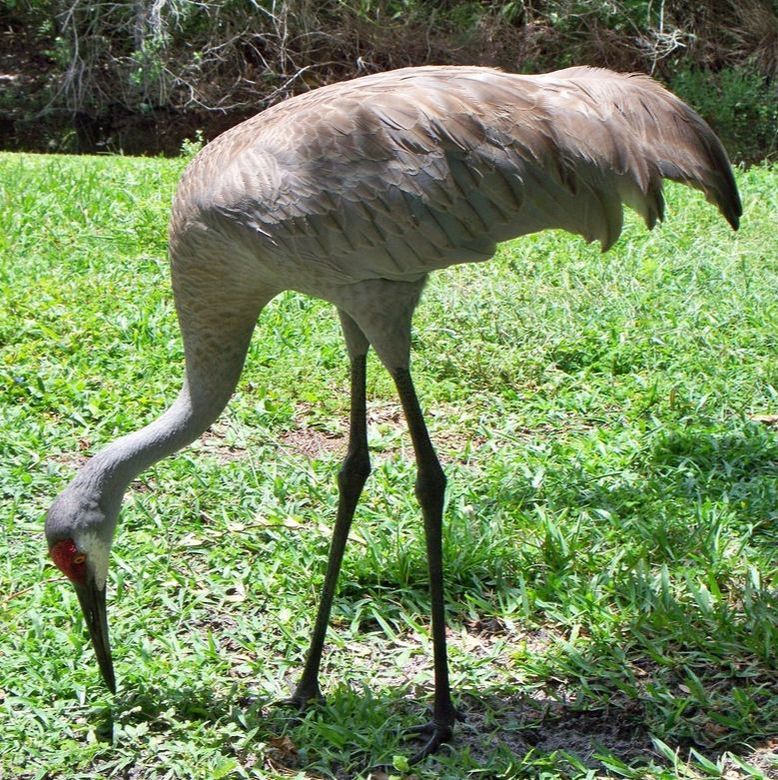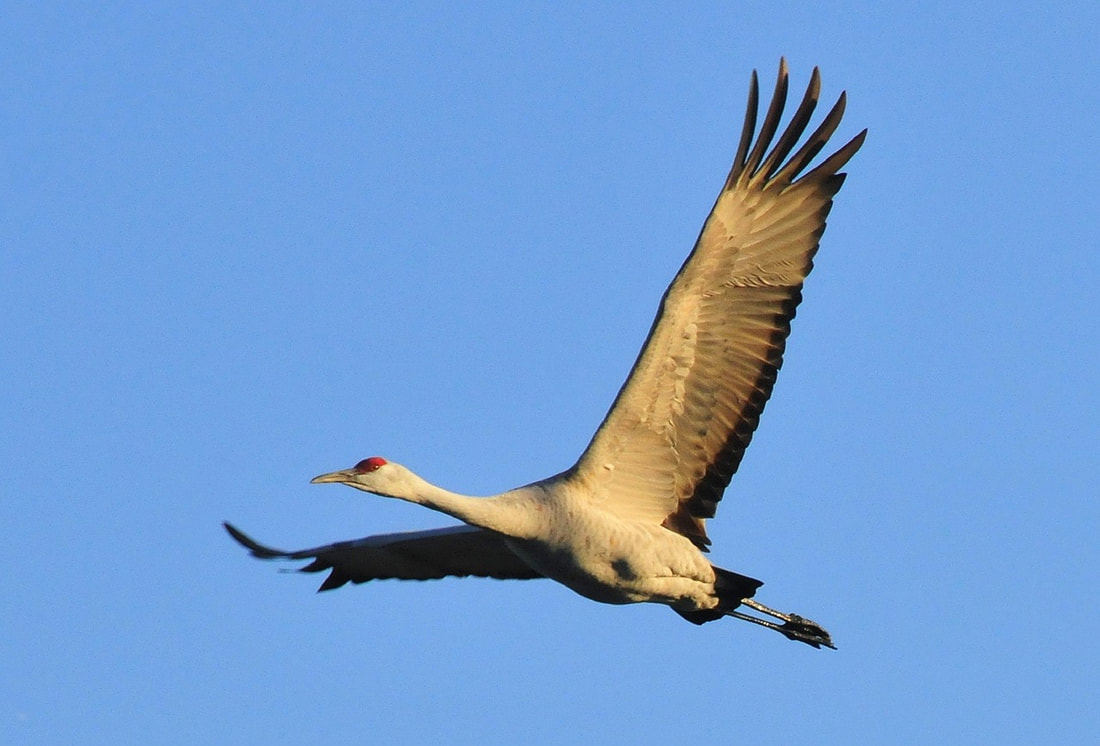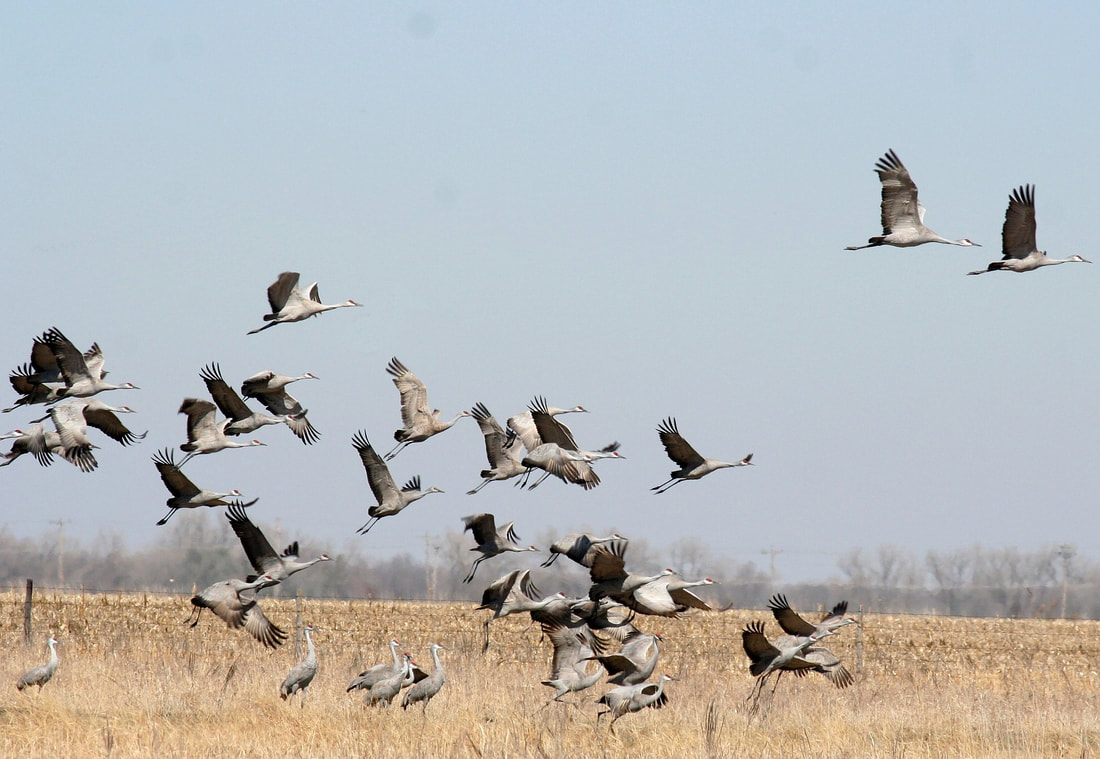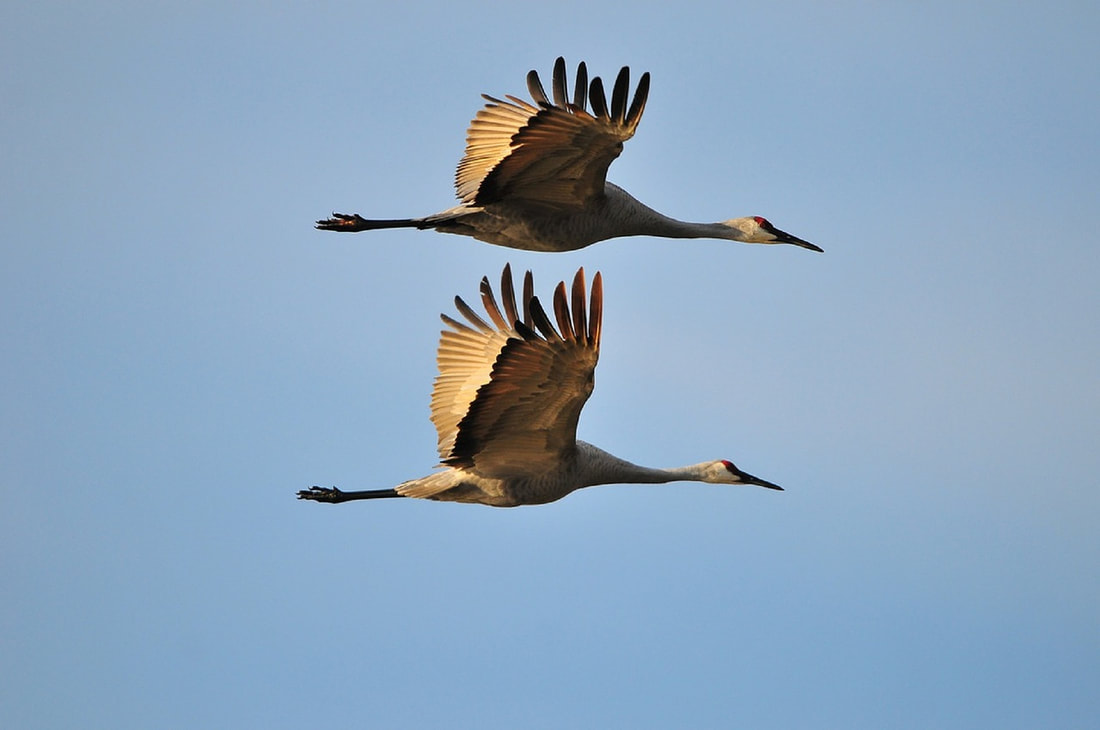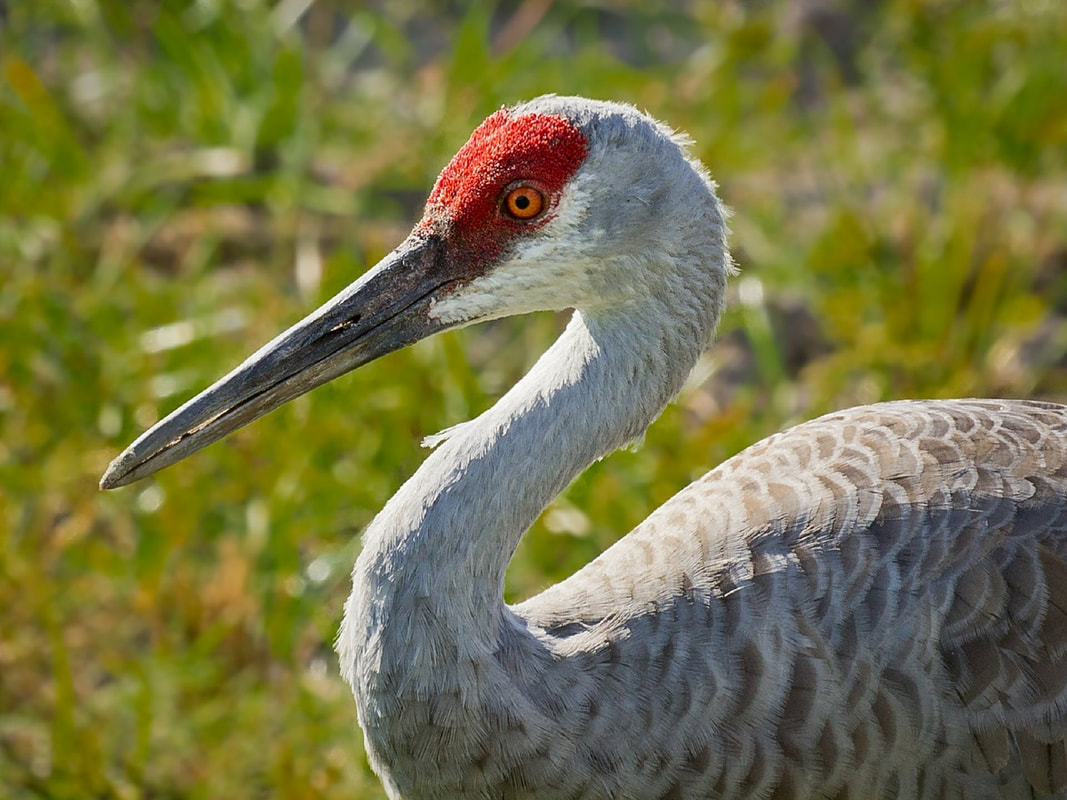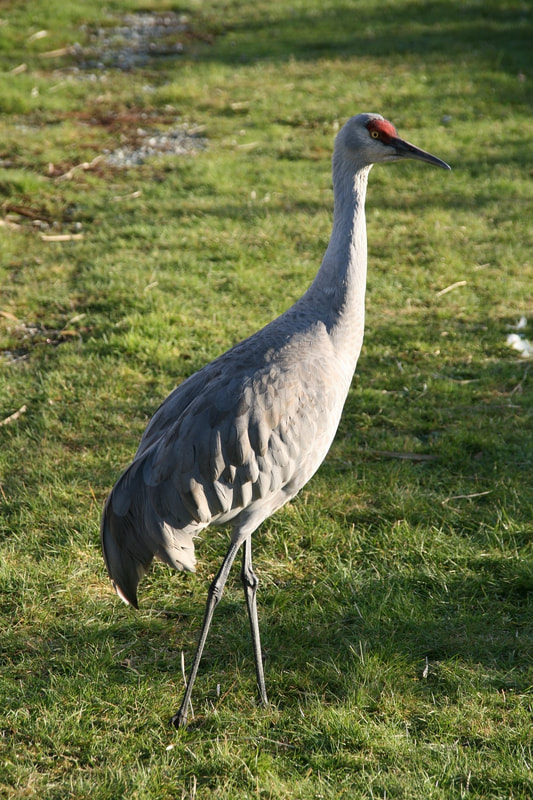"If you take care of the birds, you take care of most of the big problems in the world." Frank Lovejoy, Conservationist
Donations can go a long way...
When you stay at Cranehaven Bed & Breakfast, you are invited to participate in a truly unique experience that you won't find anywhere else. The cranes make this place special. Every fall and winter morning, in the early twilight of pre-dawn, Susanlily gets up and heads outside to prep for the crane's arrival. It is an invigorating and a wonderful way to start your day. (It also works up a dandy appetite for breakfast when you come in!) To participate in this early morning adventure, all that is required is that you be dressed and ready to go outside by 6 A.M. Donations to our Help Feed the Cranes Fund are always appreciated. If you wonder what is actually involved in feeding the cranes, read on....
The cranes visit the land at Cranehaven about 6 months out of the year. Every day, from about October 16th through April 16th, we provide supplemental food (beyond what they forage off the land itself) for the cranes, and other winter bird visitors. At the height of the their visitation (mid-November- late January), we have approximately 200 - 300 cranes on a daily basis. Before and after that period of heaviest daily crane presence, we have about 100 - 200 cranes on our land each day. It is a big and costly job to support the migrating crane population like this, but it is an expense that pays for itself in the joy and well-being it brings to both bird and man. You too, are welcome to share in this extraordinary experience.
It actually begins in the evening, just before the sun goes down, when all the visiting cranes rise up in small flocks and fly back to their nighttime retreats. The cranes roost on and around the many small islands in the Rio Grande River and at the Bosque Del Apache, where they are better protected from predators. Just as the cranes are leaving our land, along with the last rays of waning sunlight, it is time for us to go into action preparing for their arrival in the coming morning. First, we fill 10 finch-type, long tube feeders with scratch poultry feed, enhanced with black-oil sunflower seeds. These tube feeders hang from tall posts Rick put up to provide feeding stations for the wintering wild birds. It never occurred to us that cranes would feed from these feeders, but, much to our surprise, the cranes quickly claimed these feeding stations as their own. They (and we) found that their long, slender bills fit in the small openings of the finch feeders quite well. We also observed that the cranes taught themselves to vigorously shake and swing the feeders so the seed falls out onto the ground below. If the weather is particularly harsh, cold, and wet, the cranes take more drastic action to access the feed by pulling the plastic bottoms out of the feeder tubes, letting the full amount of seed cascade down onto the grass where they can get at it more quickly and easily. Along with these seed feeders, we put up 2 suet baskets. In very cold or wet weather, the cranes will empty them in a single day. When the weather is not as adverse, it usually takes 2 - 3 days to empty the suet feeders. On average, we hang about 6 suet-filled wire-basket feeders each week.
Additionally, in the evenings, we place 5 (20-lb.) wild-bird seed blocks in various locations over about 10 acres of Cranehaven Wild Bird Sanctuary. The cranes will cluster in smaller groups around these food sources too. The seed blocks are replaced weekly, which in cold weather is none too often, as the blocks are fully consumed within about 5 days. When a new block appears, the cranes in the group who feed at that location are very active and vocal in expressing their approval of the reappearing food source. We also use the evenings to refill the many water tubs we have provided near the feeding stations. By nightfall, the cranes are gone and the table is set, so to speak, in anticipation of their return in the early morning hours.
Before the winter sun rises, we go about doing our pre-dawn preparations for the returning cranes. We will meet in the kitchen about 5:45 a.m. and be outside by 6 a.m. Each person will receive a bucket of dried corn and a small flashlight to help illuminate the terrain. We start by casting our buckets of corn and/or poultry scratch in areas pointed out by Susanlily. A total of 50 pounds of dried corn is spread over about 5-10 acres. Susanlily does this accompanied by their 3 dogs, Ethan, George and Rosie. But when you stay at Cranehaven B & B, you too, are invited to join in this exciting early morning ritual. In return for your early morning efforts, you will be generously rewarded with the extraordinary experience of witnessing sunrise when the cranes fly in over your head, the air filled with their trumpeting, their v-shaped flying formations, and the massed flapping of giant wings. You will watch as they search the ground for the day's location of corn you just spread for them. Then, you will witness their gentle landings, as they prepare to float back down to the ground, their long legs dangling below the opened parachute of their extended wings. It is an experience that will stay with you forever. There is nothing like personally participating in the energy of the morning massed crane fly-in.
But all this positive human/bird interaction has a very real monetary cost. The price of grain varies from year to year, but, regardless of the cost, we have hundreds of cranes who gather here each day expecting to find food to help them survive the winter. Because we regularly (weekly) buy in bulk over these 6 months of the year, we often receive a modest price discount from independent owners of local feed stores. This is how they show support and appreciation for our private crane preserve. Every penny we can save helps to feed the cranes during the upcoming week. Between the cost of the poultry scratch, the sunflower seeds, the dried corn and the wild-bird seed blocks, we spend approximately $200 - $250 per week. That adds up to about $5,000 - $6,000 each crane season in just grain alone. We have done this every winter for the past 24 years.
This is a mighty financial burden for us to carry by ourselves. We have set up Donation Fund through PayPal to help defray this cost and to help care for our feathered friends. Any help you can give to assist the cranes that stay here over their winter migration, will make it possible for us to keep supporting our crane friends during their winter stay. Your complete donation, all 100%, will go directly to providing food and protection for the cranes. We thank you for your participation in this wonderful and most unusual relationship between man, cranes and Nature. We are grateful and pleased to have you join us in us in this effort of cross-species interaction in both your physical presence and your financial contributions. Thank you.
The cranes visit the land at Cranehaven about 6 months out of the year. Every day, from about October 16th through April 16th, we provide supplemental food (beyond what they forage off the land itself) for the cranes, and other winter bird visitors. At the height of the their visitation (mid-November- late January), we have approximately 200 - 300 cranes on a daily basis. Before and after that period of heaviest daily crane presence, we have about 100 - 200 cranes on our land each day. It is a big and costly job to support the migrating crane population like this, but it is an expense that pays for itself in the joy and well-being it brings to both bird and man. You too, are welcome to share in this extraordinary experience.
It actually begins in the evening, just before the sun goes down, when all the visiting cranes rise up in small flocks and fly back to their nighttime retreats. The cranes roost on and around the many small islands in the Rio Grande River and at the Bosque Del Apache, where they are better protected from predators. Just as the cranes are leaving our land, along with the last rays of waning sunlight, it is time for us to go into action preparing for their arrival in the coming morning. First, we fill 10 finch-type, long tube feeders with scratch poultry feed, enhanced with black-oil sunflower seeds. These tube feeders hang from tall posts Rick put up to provide feeding stations for the wintering wild birds. It never occurred to us that cranes would feed from these feeders, but, much to our surprise, the cranes quickly claimed these feeding stations as their own. They (and we) found that their long, slender bills fit in the small openings of the finch feeders quite well. We also observed that the cranes taught themselves to vigorously shake and swing the feeders so the seed falls out onto the ground below. If the weather is particularly harsh, cold, and wet, the cranes take more drastic action to access the feed by pulling the plastic bottoms out of the feeder tubes, letting the full amount of seed cascade down onto the grass where they can get at it more quickly and easily. Along with these seed feeders, we put up 2 suet baskets. In very cold or wet weather, the cranes will empty them in a single day. When the weather is not as adverse, it usually takes 2 - 3 days to empty the suet feeders. On average, we hang about 6 suet-filled wire-basket feeders each week.
Additionally, in the evenings, we place 5 (20-lb.) wild-bird seed blocks in various locations over about 10 acres of Cranehaven Wild Bird Sanctuary. The cranes will cluster in smaller groups around these food sources too. The seed blocks are replaced weekly, which in cold weather is none too often, as the blocks are fully consumed within about 5 days. When a new block appears, the cranes in the group who feed at that location are very active and vocal in expressing their approval of the reappearing food source. We also use the evenings to refill the many water tubs we have provided near the feeding stations. By nightfall, the cranes are gone and the table is set, so to speak, in anticipation of their return in the early morning hours.
Before the winter sun rises, we go about doing our pre-dawn preparations for the returning cranes. We will meet in the kitchen about 5:45 a.m. and be outside by 6 a.m. Each person will receive a bucket of dried corn and a small flashlight to help illuminate the terrain. We start by casting our buckets of corn and/or poultry scratch in areas pointed out by Susanlily. A total of 50 pounds of dried corn is spread over about 5-10 acres. Susanlily does this accompanied by their 3 dogs, Ethan, George and Rosie. But when you stay at Cranehaven B & B, you too, are invited to join in this exciting early morning ritual. In return for your early morning efforts, you will be generously rewarded with the extraordinary experience of witnessing sunrise when the cranes fly in over your head, the air filled with their trumpeting, their v-shaped flying formations, and the massed flapping of giant wings. You will watch as they search the ground for the day's location of corn you just spread for them. Then, you will witness their gentle landings, as they prepare to float back down to the ground, their long legs dangling below the opened parachute of their extended wings. It is an experience that will stay with you forever. There is nothing like personally participating in the energy of the morning massed crane fly-in.
But all this positive human/bird interaction has a very real monetary cost. The price of grain varies from year to year, but, regardless of the cost, we have hundreds of cranes who gather here each day expecting to find food to help them survive the winter. Because we regularly (weekly) buy in bulk over these 6 months of the year, we often receive a modest price discount from independent owners of local feed stores. This is how they show support and appreciation for our private crane preserve. Every penny we can save helps to feed the cranes during the upcoming week. Between the cost of the poultry scratch, the sunflower seeds, the dried corn and the wild-bird seed blocks, we spend approximately $200 - $250 per week. That adds up to about $5,000 - $6,000 each crane season in just grain alone. We have done this every winter for the past 24 years.
This is a mighty financial burden for us to carry by ourselves. We have set up Donation Fund through PayPal to help defray this cost and to help care for our feathered friends. Any help you can give to assist the cranes that stay here over their winter migration, will make it possible for us to keep supporting our crane friends during their winter stay. Your complete donation, all 100%, will go directly to providing food and protection for the cranes. We thank you for your participation in this wonderful and most unusual relationship between man, cranes and Nature. We are grateful and pleased to have you join us in us in this effort of cross-species interaction in both your physical presence and your financial contributions. Thank you.
Why not Donate Today? Please use the handy DONATE Button below - this will take you to PayPal (only, as currently, other credit cards cannot be processed). But, the good news is that you don't have to have a PayPal account to successfully make a monetary donation. Thank you for your help!
